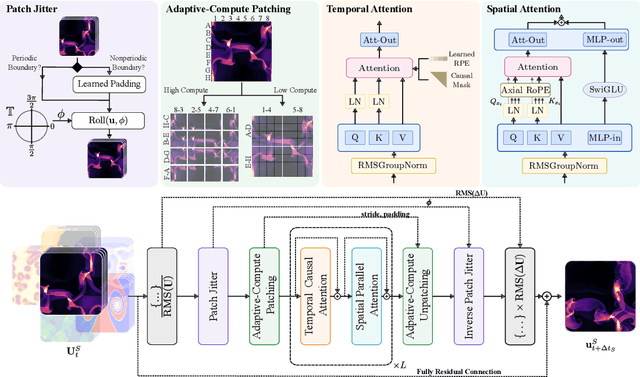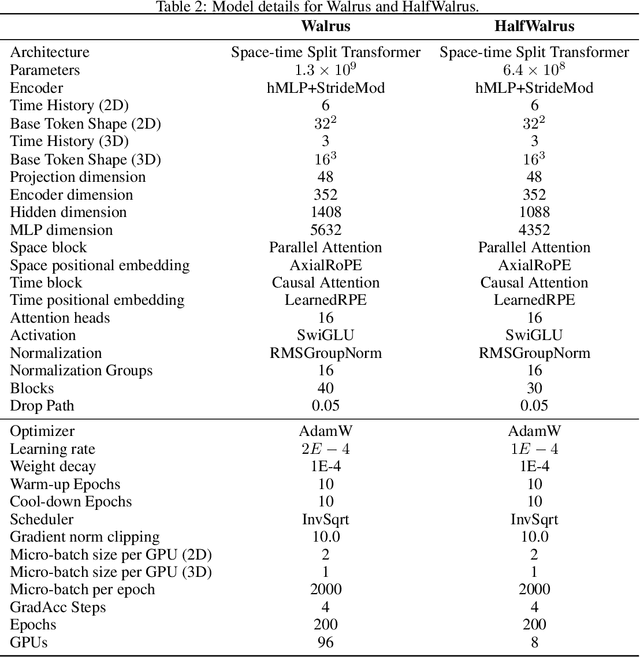Jeff Shen
Walrus: A Cross-Domain Foundation Model for Continuum Dynamics
Nov 19, 2025



Abstract:Foundation models have transformed machine learning for language and vision, but achieving comparable impact in physical simulation remains a challenge. Data heterogeneity and unstable long-term dynamics inhibit learning from sufficiently diverse dynamics, while varying resolutions and dimensionalities challenge efficient training on modern hardware. Through empirical and theoretical analysis, we incorporate new approaches to mitigate these obstacles, including a harmonic-analysis-based stabilization method, load-balanced distributed 2D and 3D training strategies, and compute-adaptive tokenization. Using these tools, we develop Walrus, a transformer-based foundation model developed primarily for fluid-like continuum dynamics. Walrus is pretrained on nineteen diverse scenarios spanning astrophysics, geoscience, rheology, plasma physics, acoustics, and classical fluids. Experiments show that Walrus outperforms prior foundation models on both short and long term prediction horizons on downstream tasks and across the breadth of pretraining data, while ablation studies confirm the value of our contributions to forecast stability, training throughput, and transfer performance over conventional approaches. Code and weights are released for community use.
ALICE: An Interpretable Neural Architecture for Generalization in Substitution Ciphers
Sep 08, 2025Abstract:We present cryptogram solving as an ideal testbed for studying neural network generalization in combinatorially complex domains. In this task, models must decrypt text encoded with substitution ciphers, choosing from 26! possible mappings without explicit access to the cipher. We develop ALICE (an Architecture for Learning Interpretable Cryptogram dEcipherment): a simple encoder-only Transformer that sets a new state-of-the-art for both accuracy and speed on this decryption problem. Surprisingly, ALICE generalizes to unseen ciphers after training on only ${\sim}1500$ unique ciphers, a minute fraction ($3.7 \times 10^{-24}$) of the possible cipher space. To enhance interpretability, we introduce a novel bijective decoding head that explicitly models permutations via the Gumbel-Sinkhorn method, enabling direct extraction of learned cipher mappings. Through early exit analysis, we reveal how ALICE progressively refines its predictions in a way that appears to mirror common human strategies for this task: early layers employ frequency-based heuristics, middle layers form word structures, and final layers correct individual characters. Our architectural innovations and analysis methods extend beyond cryptograms to any domain with bijective mappings and combinatorial structure, offering new insights into neural network generalization and interpretability.
The Well: a Large-Scale Collection of Diverse Physics Simulations for Machine Learning
Nov 30, 2024



Abstract:Machine learning based surrogate models offer researchers powerful tools for accelerating simulation-based workflows. However, as standard datasets in this space often cover small classes of physical behavior, it can be difficult to evaluate the efficacy of new approaches. To address this gap, we introduce the Well: a large-scale collection of datasets containing numerical simulations of a wide variety of spatiotemporal physical systems. The Well draws from domain experts and numerical software developers to provide 15TB of data across 16 datasets covering diverse domains such as biological systems, fluid dynamics, acoustic scattering, as well as magneto-hydrodynamic simulations of extra-galactic fluids or supernova explosions. These datasets can be used individually or as part of a broader benchmark suite. To facilitate usage of the Well, we provide a unified PyTorch interface for training and evaluating models. We demonstrate the function of this library by introducing example baselines that highlight the new challenges posed by the complex dynamics of the Well. The code and data is available at https://github.com/PolymathicAI/the_well.
Multiscale Feature Attribution for Outliers
Oct 30, 2023Abstract:Machine learning techniques can automatically identify outliers in massive datasets, much faster and more reproducible than human inspection ever could. But finding such outliers immediately leads to the question: which features render this input anomalous? We propose a new feature attribution method, Inverse Multiscale Occlusion, that is specifically designed for outliers, for which we have little knowledge of the type of features we want to identify and expect that the model performance is questionable because anomalous test data likely exceed the limits of the training data. We demonstrate our method on outliers detected in galaxy spectra from the Dark Energy Survey Instrument and find its results to be much more interpretable than alternative attribution approaches.
 Add to Chrome
Add to Chrome Add to Firefox
Add to Firefox Add to Edge
Add to Edge